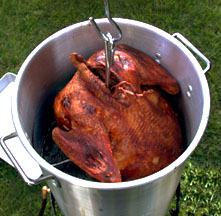 Frying turkeys during the holidays has recently become very popular all over the country, including right here in South Florida.
Frying turkeys during the holidays has recently become very popular all over the country, including right here in South Florida.
The popularity has to do with a number of reasons, including the reduced time needed to cook a turkey in a deep fryer, versus other conventional methods such as an oven or a rotisserie grill.
But another reason it has become so popular, quite simply, is because fried turkey tastes great.
However, with the increased popularity of turkey fryers over the past several years also comes increased risk. Indeed, twice as many cooking related house fires occur on Thanksgiving than on any other day of the year. Not only that, but the fires on Thanksgiving are typically deadlier and more expensive.
While most Americans are counting their blessings, firefighters are putting out nearly 4,300 blazes. On a normal day, 23% of fires take place in residences, but on Thanksgiving, that percentage jumps to 35%. The vast majority of these fires–83%–start on top of the stove or in the oven. These blazes claim more lives than fires on an average day, and cause 25% more property damage.
Additionally, while frying turkeys has become much more prevalent during Thanksgiving, so have the fires associated with turkey fryers. Part of the reason for the increased amount of fires associated with frying a turkey is the equipment used to fry the turkey. The large fryers use gallons of cooking oil, which boils at 325 degrees Fahrenheit. If too much oil is added it can easily boil over–or the fryers can tip–creating the perfect catalyst for a holiday fire that could cause extensive damage, or even death.
From 1998 to 2007, there were 138 reported incidents involving turkey fryers, according to the US Consumer Product Safety Commission. These resulted in 36 injuries and nearly $8 million in property loss.
If you chose to fry a turkey during Thanksgiving, or the holidays, here are some safety tips to follow:
• Only use a container specifically designed to fry turkeys and follow the manufacturer’s directions for use.
• Turkey frying is an outdoor activity only. Set the fryer a safe distance away from any building, especially homes and sheds. Do not use a fryer on a wooden deck or inside a garage.
• Never leave a turkey fryer unattended. Remember that you have flammable oil heating over an open flame with no temperature control so don’t take any chances.
• Use an oil with a high smoke point like peanut, canola, or safflower oils.
• Before using oil in a fryer, measure how much you will need by placing the turkey in the fryer and adding water until it is 1 to 2 inches over the turkey. Remove the turkey and mark the water line. Use this line to indicate how much oil to use. Remove the water and dry the fryer thoroughly before filling it with oil to the designated line.
• Always use a defrosted turkey. Lower and raise the turkey slowly so the hot oil will not splash.
• The cook should wear gloves, long sleeves and an apron to avoid burns from splashing oil.
• Be sure to keep an all-purpose fire extinguisher near by. Never attempt to put out a grease fire with water!
• Once the turkey is done, turn off the heat source to let the oil cool.
• Be sure to keep kids and pets away from the fryer since the oil will remain hot for hours after use.
—–
EXTENDED BODY:
Our Miami insurance dispute lawyers handle fire claims for homeowners. Our attorneys represented insurance companies before 2006, when we opened a firm dedicated to fighting for the rights of consumers. We understand how insurance companies work. And we have the knowledge and experience necessary to represent homeowners in disputes over an insurance claim.